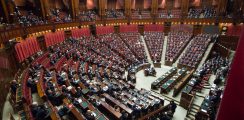In late 2017, Mainstreet Research was tasked with a study that challenged and fascinated us.
We were asked to examine social isolation and loneliness in Canadian society. This survey was one of the largest and most in-depth we had undertaken to date and required many conversations and meetings about the script design. The research to perfect the script, and even those discussions were fascinating. Discussing the role that media, technology and social media plays in modern society was a very interesting exercise. The results of the live call and online panel hybrid study revealed insights that surprised all of us. Sadly, the client chose not to release it publicly.

In 1995, Robert Putnam opined that “social capital” was in decline across America in an essay titled “Bowling Alone: America’s declining social capital”. This essay was later turned in to the book, “Bowling Alone: The Collapse and Revival of American Community”.
The premise of the essay and book was that the sense of community, what Mr. Putnam calls “social capital” was in decline since the 1950s. The decline of social capital, what Putnam defines as the reduction in all the forms of in-person social intercourse upon which people used to found, educate, and enrich the fabric of their social lives, was tied to the rise of television as a media. This study found similar results to previous studies earlier in the 20th century that concluded the rise of radio led to similar declines in in-person interactions. Hence the title, bowling alone.
Now since 2000, we’ve had tremendous technological and social change. The Internet, and more precisely, the rise of social media has revived community and social connections in a way we could not have dreamed of. As Facebook and others began to create online communities, this initially increased social capital. Smartphones that let us do banking, shopping, and nearly every other task, should have created more free time to have those in-person interactions, but have actually done the reverse.
Our study on social isolation and loneliness concluded that increased use of social media and increased use of devices like smartphones and tablets correlated with loneliness. The script design contained the shortened UCLA Loneliness Scale. Other research done in this area points to other factors that contribute to feelings of loneliness and social isolation, like living alone, aging without loved ones around, lack of social interaction but our research showed that even among younger people with family and friends, social media & smartphone use was related to increased loneliness based on the UCLA loneliness scale.
We are now all familiar with the dangers of social media in terms of privacy, but I want to suggest there is a greater danger to our social fabric from the algorithms that social media employs to deliver content. Confirmation bias steers us all towards interpreting information and opinion that only serves to confirm what we already believe. These algorithms take it a step further by amplifying confirmation bias, by largely only showing us information that we already agree with (and in some cases, vehemently disagree with).
Putnam proposed in 1995 and again in 2000 that a decline in social capital was bad for democracy. It led to reduced participation in volunteerism, social and even political engagement, even lowered voter participation. That disconnection to community leads to further feelings of isolation. I think we can all agree that online and social media discourse has declined of civility, with sometimes catastrophic consequences.
Recent elections like the 2016 Presdiential election have lowered the bar for political discourse in every way. Largely that is due to the current President, but even Democrats contributed to a tone never taken before. There is little or no room for civil disagreement, or honest debate. Connected communities of like-minded individuals swarm those who they disagree with until they are silenced, discredited or join groups of their own like-minded individuals as a defense mechanism. This is causing a dramatic polarization of opinion.
The divergence in public opinion research we’ve been seeing since 2017 may continue as a result of this polarization and confirmation bias. It’s important to remember that the bubble that social media has created for us is not representative of our community, or of the Province, when looking at polls.
So before we start the actual campaign, please consider my advice, just follow trend lines.
Also, take a walk, maybe go talk to your neighbours, leave your smartphone at home. And when you get home, call someone you haven’t talked to in a while, they probably miss you more than you know.

